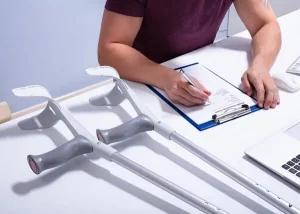Accidents



Disability benefits are, in many cases, permanent once the applicant has been approved to receive Social Security Disability Insurance (SSDI) payments. Once the recipient is old enough to be eligible to receive Social Security retirement benefits, then their SSDI benefits will be converted into a retirement benefits plan.
These are four scenarios in which SSDI benefits will terminate:
Read on to learn more about how each of these factors might come into effect, and refer to a Florida disability lawyer for assistance, representation, and guidance with applying for or continuing to receive disability.
When first applying for disability, a medical examiner will make a determination as to whether you are capable of working. Not only will they determine if you have a disability that qualifies you to receive SSDI, but they will also make a determination as to how likely your condition is to improve.
All individuals are expected to recertify their disability status at least once every 7 years, regardless of the potential for improvement. This process is referred to as a continuing disability review or CDR. Individuals with possible medical improvement (MIP) will likely have to attend another screening exam once every 3 years. If medical improvement is expected (MIE), then the individual will have a follow-up exam scheduled after the period of expected medical improvement has lapsed, usually around 6 – 18 months.
It is worth noting that individuals over 55 are less likely to receive an MIE or MIP designation because older individuals are statistically less prone to recuperate from a condition that prevents them from working for at least a year (the minimum condition required for SSDI eligibility).
Individuals may be sent a form requesting an update in lieu of having a full screening exam. Recipients with a low chance of improvement will be sent a Disability Update Report form. Those who have higher chances of improvement will receive a long-form Continuing Disability Review Report form.
The Social Security Administration also expects SSDI recipients to be forthcoming about any medical improvement. If the individual is able to return to work or shows unexpected improvement during a recent medical evaluation, they should notify the SSA in a timely manner.
Substantial gainful activity (SGA) limitations mean that an SSDI recipient may become ineligible if they return to work and begin earning an income once more. After all, the purpose of the program is to provide benefits to those who are unable to work.
Current SGA income limits are $1,310 per month for SSDI. This does not have to include all gross income since there are exemptions and allowances for expenses, especially those directly related to the disability.
Individuals are allowed to work during a trial period of up to nine months in a rolling five-year period as part of the SSA’s “work incentives” program. The intent of this program is for someone to see if they can return to work without instantly losing their SSDI benefits.
Eligibility for SSDI will terminate upon the 10th month in the rolling five-year time period. However, recipients will still have a 36-month window of extended eligibility. If they find their condition worsens or they are unable to continue working during this period, then they request to restart benefits without having to go through the entire application process again.
While serving a prison sentence for the commission of a felony, an SSDI recipient is ineligible to receive any benefits. These benefits may resume upon parole or full completion of the prison sentence.
Any suspected attempts to defraud the SSA will be investigated thoroughly. If an internal investigation determines that fraud has been committed, then benefits will terminate immediately. The SSA will then criminally prosecute the suspect for their alleged fraud.
Many SSDI recipients can continue to receive benefits until they are old enough to receive Social Security retirement benefits. This is not always the case, however, especially for individuals who wish to earn some income or whose condition may substantially improve.
The SSA isn’t always accurate in its assessments, and documenting your eligibility can be difficult in some situations. You can seek representation from an experienced Florida disability lawyer for assistance in maintaining your eligibility for continued disability benefits.
Hoskins, Turco, Lloyd & Lloyd has assisted thousands of individuals with disabilities as they seek to continue receiving the payments they need. Schedule a free, no-obligation consultation when you call 866-460-1990 or contact us online.
Complete our confidential evaluation form to have your case reviewed for free by our attorneys and staff.
An attorney or intake specialist will contact you directly to discuss your case at no cost to you.
From the moment you hire us, we will stand behind you, fighting to get the results you deserve.
As the law firm Florida has trusted for over 40 years to fight on their behalf, we are more than ready to represent you. Put our experience and reputation to work. If you need help with any legal matter, whether it’s a personal injury, workers’ compensation, disability or bankruptcy case, contact us now. The consultation is absolutely free.
Get the answers you need. We’ll review your case today, for free.
"*" indicates required fields